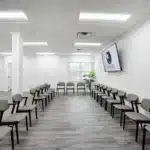Choosing a luxury rehab in NJ isn’t about decor; it’s about medically sound treatment, safety, and privacy. This overview explains what “luxury” should include, how to verify licensing & accreditation, therapies to expect, costs and insurance, and how intake works, so families can make confident, evidence-based decisions without sacrificing comfort. Clinical standards come first.
Key Takeaways
- Safety comes first: verify NJ DMHAS licensure, independent accreditation (The Joint Commission or CARF), 24/7 nursing and physician oversight; emergency protocols should be clear.
- Expect strong, evidence-based care: thorough assessment, ASAM-aligned placement, MAT when indicated, CBT/DBT, integrated mental health, family work & aftercare that starts early.
- Comfort supports recovery—not the treatment itself: private rooms, low client-to-staff ratios, nutrition-forward meals, fitness and quiet spaces; privacy policies matter (HIPAA, visitor rules).
- Plan costs and privacy early: confirm insurance benefits, in-network vs out-of-network, what’s included vs add-ons; request an itemized estimate, ask about devices and tech expectations.
- Rolling Hills Recovery Center is a drug and alcohol rehab and addiction treatment center in New Jersey that offers evidence-based addiction treatment and holistic approaches. The team of experienced professionals is dedicated to helping individuals overcome substance abuse and achieve lasting results.
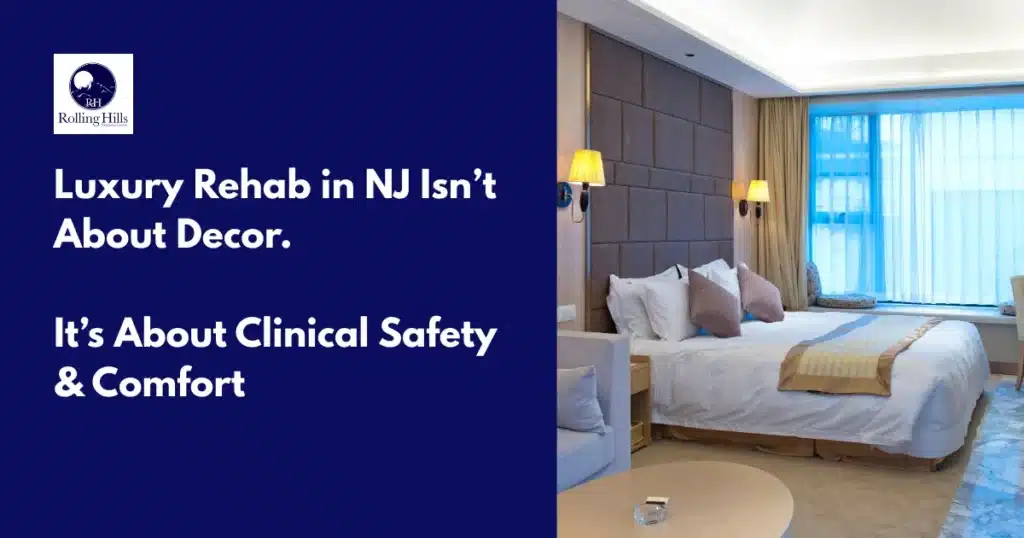
What “Luxury Rehab” Means in New Jersey
Clinical Core, Not Just Amenities
In New Jersey, “luxury rehab” should start with clinical strength. A truly high-end program does not trade medical safety for comfort. The baseline elements that matter most:
- NJ-licensed medical detox with 24/7 nursing on-site when detox is indicated
- Physician oversight daily or as clinically appropriate, with on-call coverage at all hours
- Evidence-based therapies (CBT, DBT skills, MI, contingency management as indicated)
- ASAM-aligned level of care placement (detox, residential, PHP, IOP) with clear criteria
- Individualized treatment plans are reviewed frequently by a multidisciplinary team
- Co-occurring mental health assessment and integrated treatment when needed
- Medication management and monitoring, including MAT when warranted
Luxury is also about predictability and access. A low client-to-staff ratio reduces wait times for medical and therapy services, and it supports deeper therapeutic work.
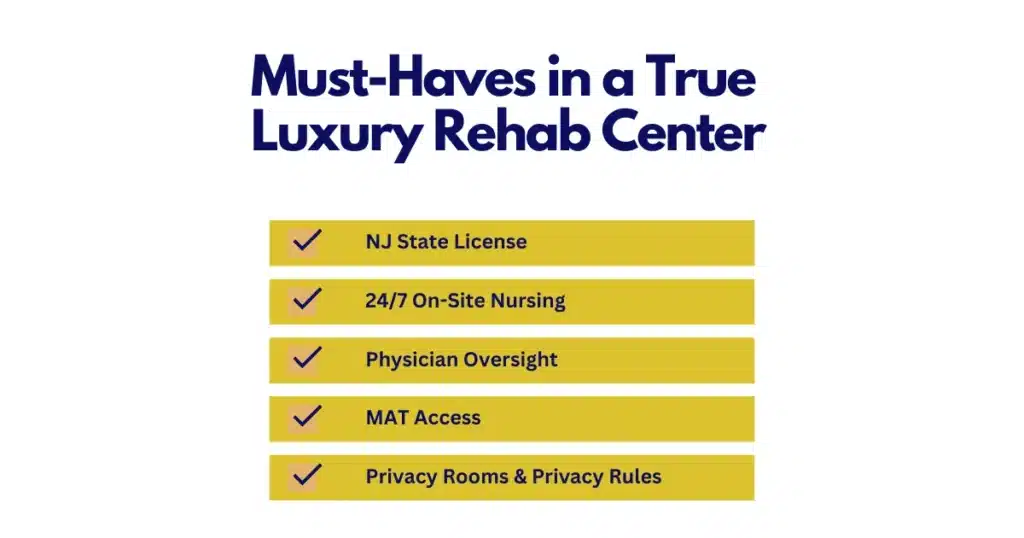
Amenities That Add Comfort Without Weakening Care
Comfort helps people focus on treatment, sleep better, and engage. Amenities that add value (without compromising clinical rigor) often include:
- Private or semi-private rooms; en-suite baths where feasible
- Chef-prepared meals with nutrition consults, snacks available off-hours
- Fitness center access, yoga or stretching, walking trails, and basic physical therapy when ordered
- Spa-like common areas, quiet reading rooms, and outdoor spaces
- Laundry service, housekeeping, and transportation to clinical appointments
- Secure, reliable Wi-Fi with thoughtful tech rules to protect privacy and recovery
The point is to reduce friction, sleep, nutrition, and physical comfort make a difference in early recovery. The program still needs to set boundaries for safety and progress.
Privacy, Security, and Discretion
Enhanced privacy is a hallmark of luxury rehab, but it must align with HIPAA and state rules:
- Controlled facility access, background-checked staff
- Private meeting spaces for therapy and family sessions
- Discreet admission processes and secure health record systems
- Clear technology and photography policies to protect all patients
For executive clients, some facilities offer structured device access and quiet workspaces. These should be clinically supervised so treatment remains the focus.
How to Verify Safety, Licensing, and Accreditation
Confirm NJ State Licensure
In New Jersey, treatment providers are overseen by the Division of Mental Health and Addiction Services (DMHAS). Before considering amenities, verify the facility’s state license:
- Visit the NJ Department of Human Services DMHAS page: NJ Department of Human Services (DMHAS)
- Ask the facility for its current NJ license number and the licensed levels of care (e.g., detox, residential, IOP)
- Confirm any recent enforcement actions or sanctions, if present
If a program cannot show proof of licensure for the level of care you need, move on.
Independent Accreditation (The Joint Commission or CARF)
Accreditation is a strong external check on safety and quality. Two widely recognized bodies:
- The Joint Commission: search a facility at Quality Check
- CARF International: verify listing at CARF International
Accreditation does not replace licensure; it complements it. Look for current (not expired) accreditation tied to the correct programs and settings.
Check Audit History and Safety Indicators
Ask for copies or summaries of the most recent survey reports. Reasonable items to request:
- Date of last survey and status of any required corrective actions
- Risk management policies (falls, contraband, elopement, sentinel events)
- Infection control procedures, especially relevant for detox units
- Emergency response drills and training frequency
A serious program will be transparent about quality and safety work. Many will share their policies or a redacted summary.
Verify Clinician Credentials and Scope
Insist on trained, credentialed staff, with adequate coverage:
- Physicians: board-certified in addiction medicine, psychiatry, or relevant specialties
- Nurses: RNs with detox experience, where applicable; 24/7 coverage for inpatient detox
- Therapists: LCSW, LPC, LMFT, PsyD/PhD; CADC/LCADC for substance use counseling
- Case managers with experience coordinating care in NJ (housing, legal, FMLA, leave)
Always ask about average caseloads and the ratio of licensed clinicians to clients.
Use Official Registries
There is no endorsed “luxury-only” list from the state. Prioritize official tools:
- NJ Department of Human Services (DMHAS)
- Quality Check
- CARF International
- SAMHSA Treatment Locator
- Review the NIDA principles of effective treatment to compare claims with evidence
Clinical Quality and Therapies to Expect
Comprehensive Medical Assessment and ASAM-Aligned Levels
Assessment begins at intake and should include:
- Substance use history, withdrawal risk, overdose risk, physical exam, and labs as indicated
- Psychiatric evaluation (screening for mood, anxiety, trauma, psychosis)
- ASAM level placement to match intensity to need:
- Withdrawal management (detox)
- Residential/Inpatient rehab
- Partial hospitalization (PHP)
- Intensive outpatient (IOP)
- Outpatient and recovery support
Care plans must be updated as you stabilize. A fixed, one-size schedule can be a warning sign.
MAT Availability and Medication Safety
Medication for Addiction Treatment (MAT) is evidence-based for opioid and alcohol use disorders. A luxury program should clearly explain:
- Which MAT options are available (buprenorphine/Suboxone, extended-release naltrexone, methadone via OTP referral, acamprosate, disulfiram when appropriate)
- Induction, monitoring, and follow-up plans
- Policies on benzodiazepines and other controlled substances
- Informed consent and diversion-prevention protocols
Patients often have questions about buprenorphine. For clarity on safety and misuse, see this resource: Can You Get High on Suboxone.
Psychotherapies: Individual, Group, and Family
Evidence-supported therapies should be central:
- Individual therapy at least 1–2 times weekly in residential levels, adjusted by need
- Group therapy daily (skills, relapse prevention, process, psychoeducation)
- Family sessions weekly or biweekly, with flexible scheduling and virtual options
- Trauma-informed approaches; EMDR or CPT available when appropriate and safe
High-end treatment adds enhancements, mindfulness training, sleep coaching, and nutritional counseling without diluting the core psychotherapy hours.
Co-Occurring Disorder Treatment
Anxiety, depression, PTSD, ADHD, and bipolar disorder commonly co-occur with substance use disorders. An integrated model:
- Psychiatric medication evaluation and stabilization
- Coordinated therapy addressing both conditions
- Care transitions to outpatient psychiatry before discharge
- Safety plans and crisis protocols that consider mental health symptoms
Make sure the program treats co-occurring disorders in-house or has formal partnerships with psychiatric providers.
Discharge Planning, Relapse Prevention, and Alumni Support
Clinical quality is measured after discharge too. A strong program provides:
- A written relapse prevention plan with triggers, coping skills, and crisis steps
- MAT continuation plan, refills, and local prescriber handoff
- Scheduling of aftercare (IOP or outpatient therapy) before discharge
- Sober housing or recovery housing referrals if needed
- Alumni programming and peer support to maintain momentum
Community support helps with accountability and connection. Many people benefit from alumni networks and ongoing check-ins; see how an alumni community can reinforce recovery by reviewing the structure of Rolling Hills NJ Alumni Program.
Cost, Insurance, and Privacy Logistics
Private Pay vs Insurance Benefits
Luxury programs often mix private pay and insurance. Key concepts:
- In-network insurance usually lowers out-of-pocket costs; pre-authorization is often required
- Out-of-network benefits may reimburse a portion after the deductible; the facility may help with claims
- Private pay (self-pay) secures access when insurance is limited or timelines are tight
Always ask for a cost breakdown in writing before admission.
What’s Included vs Add-Ons
Common inclusions:
- Room and board, nursing, physician visits, therapy sessions, case management
- Routine labs and basic medications for detox or stabilization
- Standard recreation and education groups
Potential add-ons (ask for pricing):
- Specialty labs, genetic testing, and neuropsychological testing
- Private duty nursing or one-to-one staffing
- Massage, acupuncture, IV therapy, and advanced fitness coaching
- Transportation beyond routine needs
Estimated Ranges and Hidden Costs
Costs vary widely. In New Jersey, residential treatment can range from several thousand per week to significantly more at the ultra-luxury tier. Ask for:
- Day rate and what the rate covers
- Professional fees billed separately (psychiatry, specialty consults)
- Pharmacy billing practices
- Refund policies if stepping down early
Insurance may cover clinical services but not luxury amenities. Clarify this early.
HIPAA Privacy, Visitor Policies, and Tech Rules
Make sure you understand:
- How your health information is protected (HIPAA compliance, EHR security)
- Visitor hours, family therapy attendance, and overnight policies
- Cell phone, laptop, and smartwatch rules; secure storage options
- Photography policy and facility guidelines for social media
Different levels of care have different restrictions. Executive policies should be transparent and structured, not ad-hoc.
Transportation Within New Jersey
Transportation can be simple but important:
- Confirm admission day pickup, airport/train logistics, and driver credentials
- Ask about transport for medical appointments and aftercare tours
- Clarify fees for long-distance travel inside NJ or to nearby airports
How to Locate Options and Start Intake
Step-by-Step Using Trusted Tools
- Identify your clinical needs first.
- If withdrawal is likely, prioritize programs with licensed medical detox and 24/7 nursing.
- If co-occurring disorders are present, look for integrated psychiatric services.
- Verify licensure.
- Use NJ Department of Human Services (DMHAS) to confirm state licensure and levels of care.
- Check accreditation.
- Look up the facility at Quality Check and CARF International to confirm current status.
- Cross-check services on SAMHSA Treatment Locator.
- Confirm levels of care, payment options, and specialties.
- Review clinical approach against NIDA principles of effective treatment.
- Avoid programs that promise quick fixes or use only one method for everyone.
- Call three programs.
- Ask the same questions to compare consistency and transparency.
- Request documents.
- Sample weekly schedule, staffing matrix, outcomes summary, and patient handbook.
- Confirm logistics.
- Insurance verification, admission window, medications on arrival, and transport plan.
What to Ask on the First Call
- Is there 24/7 nursing on-site? What is overnight medical coverage?
- How many patients per therapist, nurse, and physician?
- How often will I have individual therapy?
- What is your MAT policy and process, including inductions and monitoring?
- Do you treat co-occurring disorders in-house? Psychiatric coverage hours?
- Can you send a sample weekly schedule and a list of groups?
- How do you involve families and support systems?
- What happens if I need a higher or lower level of care mid-stay?
Request Documents: Weekly Schedule, Outcomes, and Policies
Ask for samples in writing:
- A weekly schedule showing individual, group, family, and wellness time
- Outcomes data: completion rates, engagement in aftercare, readmission rates at 30/90 days
- Policy summaries: technology, visitors, contraband, grievance process
- Medication management procedures and on-call coverage policy
If outcomes are not tracked or cannot be shared in a de-identified manner, proceed cautiously.
Red Flags to Avoid
- No proof of NJ licensure or expired accreditation
- No 24/7 clinical coverage for settings that require it
- Exclusive reliance on one therapy type for all patients
- Guaranteed “cure” language or promises that conflict with evidence
- Vague answers about staff credentials or caseloads
- Pushy sales tactics without clinical assessment
Questions to Ask Before Choosing
- What is the medical coverage at night and on weekends? Who is on call, and what is the escalation plan?
- How are medical or psychiatric emergencies handled? Transfer agreements with local hospitals?
- What is the average caseload per therapist, nurse, and physician?
- What experience do you have with co-occurring disorders such as PTSD, bipolar disorder, or ADHD?
- What is your policy on benzodiazepines, stimulants, and MAT? How is diversion prevented?
- How are families involved in care? Tele-family sessions available?
- How do you measure outcomes? Do you publish any summary data?
- What does aftercare coordination look like in New Jersey? Warm handoffs to PHP/IOP or outpatient psychiatry?
- How do you handle confidentiality for high-profile or executive clients?
- What are the technology rules? Is limited device time possible when clinically appropriate?
- What is included in the quoted price, and what are common add-ons?
- Are private rooms guaranteed or based on availability?
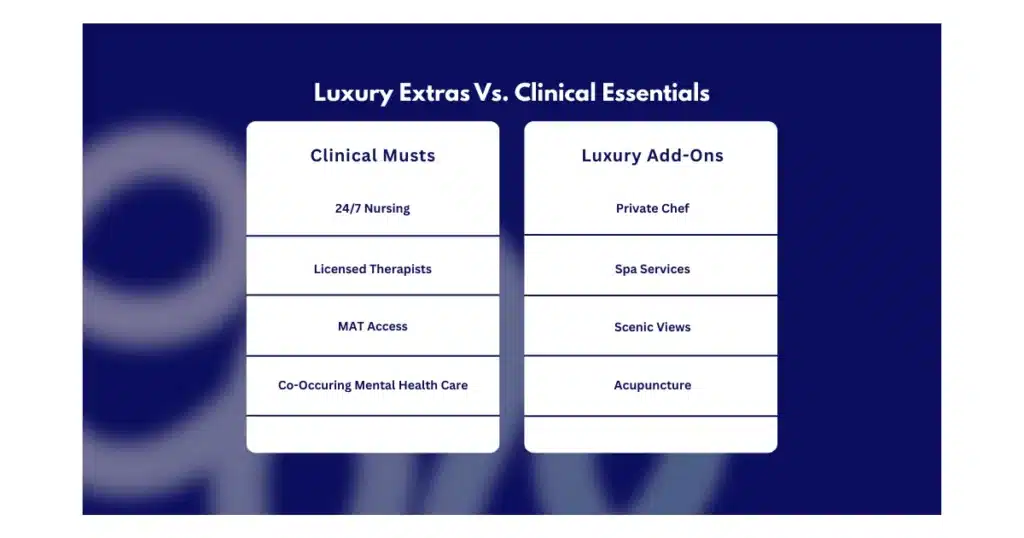
Quick Comparison: Clinical Must-Haves vs Luxury Extras
| Area | Clinical must-haves | Luxury extras that help |
|---|---|---|
| Safety | NJ licensure, 24/7 nursing for detox/residential, on-call physician | Private security, discreet transport |
| Therapies | Evidence-based individual and group therapy, family work | Expanded wellness menu (mindfulness, sleep coaching) |
| Medications | MAT options, medication management, diversion control | Pharmacogenetic testing if indicated |
| Staffing | Low client-to-staff ratios, licensed clinicians | Additional concierge staff for logistics |
| Privacy | HIPAA compliance, private therapy rooms | Private suites, enhanced visitor privacy |
| Aftercare | Discharge plan, alumni and peer support | Personalized coaching post-discharge |
If the left column is weak, the right column won’t matter.
Cost and Coverage Snapshot
| Topic | What to clarify | Why it matters |
|---|---|---|
| In-network vs out-of-network | Deductibles, co-insurance, pre-auth | Determines out-of-pocket costs |
| Private pay | Day rate, length-of-stay estimate, refund policy | Prevents billing surprises |
| Included services | Therapy hours, medical visits, labs | Verifies clinical intensity |
| Add-ons | Specialty testing, alternative therapies, extended transport | Controls costs |
| Pharmacy | Which meds are included; how MAT is billed | Avoids unexpected charges |
| Tech and lodging | Private room fees, device policies | Balances comfort and treatment |

Request a written “good-faith estimate” when possible.
Practical Templates You Can Use Today
Intake Call Checklist (Copy/Paste)
- NJ license number and licensed levels of care
- Current accreditation (Joint Commission or CARF), next survey date
- 24/7 coverage: nursing on-site? physician on-call?
- Average caseloads: therapist/nurse/physician
- MAT options and policies, including inductions
- Co-occurring psychiatric coverage hours
- Sample weekly schedule received: yes/no
- Outcomes summary or metrics provided: yes/no
- Family involvement: frequency and format
- Room type: private/semi-private; guaranteed?
- Tech policy: phone/laptop hours; secure storage
- Price quote and list of add-ons received: yes/no
- Transportation plan for admission and discharge
- Aftercare coordination process described: yes/no
Discharge Planning Must-Haves
- Confirm IOP or outpatient appointments scheduled before discharge
- Written relapse prevention plan with warning signs and coping skills
- MAT continuation plan and prescription handoffs
- Safety plan including crisis numbers and local supports
- Alumni contacts and early recovery meeting plan
- Release of information forms signed for key providers and supports
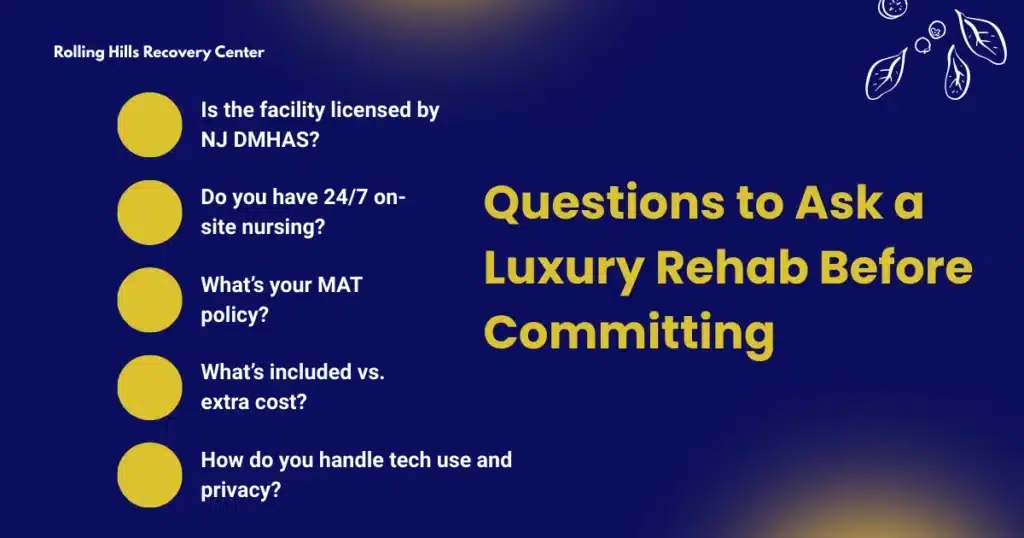
Clinical Quality Markers to Look for On-Site
- Medication room secured and audited; clear MAR documentation
- Staff visibly wearing credentials; RN presence after hours
- Whiteboards or dashboards that show groups, coverage, and on-call info (patient identifying data protected)
- Calm milieu: consistent schedules, respectful boundaries, safe storage for devices
- Routine urine drug screens with confirmatory testing when needed
- Fire, emergency, and infection control signage and drills documented
Considerations for Rolling Hills Recovery Center’s Audience
Align Luxury Expectations With the Right Level of Care
Comfort supports recovery, but clinical fit remains first. For individuals in New Jersey:
- If at risk for withdrawal, choose a program with licensed medical detox and 24/7 nursing
- If long-standing mental health symptoms are present, ensure integrated psychiatric care
- If work obligations are unavoidable, ask about structured tech access that does not derail therapy
Luxury should never mean less therapy or less medical oversight.
Prioritize Verified Licensure and Accreditation
Programs serving New Jersey residents should openly display:
- NJ DMHAS licensure for each level of care they offer
- Current accreditation (Joint Commission or CARF)
- Transparent staffing ratios and clinician credentials
- A clear escalation plan for emergencies
These elements protect patient safety and ensure reliable care.
Select Programs That Share Data and Tailor Care
Facilities that align with evidence-based standards:
- Assess using ASAM criteria and adjust level of care as needs change
- Track outcomes and share summary metrics upon request
- Offer individualized therapy doses, more time when acuity is higher, not less
- Coordinate aftercare within New Jersey’s network to sustain gains
Wellness supports can be part of this individualized plan. Physical activity is often a helpful, practical tool—see how movement enhances recovery in Exercise in Addiction Recovery.
Keep Focus on Core Therapies While Integrating Holistic Work
Holistic elements, such as mindfulness, gentle fitness, and nutrition counseling, can complement cognitive and behavioral therapies. The goal is not to replace core treatments but to improve sleep, stress control, and mood regulation. Avoid programs that only offer amenities or alternative services while reducing evidence-based care hours.
MAT Clarity for Opioid and Alcohol Use Disorders
New Jersey patients and families should ask for a straight answer on MAT use:
- Which medications are available in-house?
- Who prescribes and monitors them?
- How do policies manage safety and diversion risks? Transparent MAT policies reflect clinical maturity.
Aftercare Connections Matter in New Jersey
What happens after discharge strongly predicts stability in early recovery. Effective programs:
- Book aftercare before the last treatment day
- Create warm handoffs to local providers, support groups, and alumni networks
- Offer structured alumni follow-up and peer connection
Final Check: Does the “Luxury” Label Match Clinical Reality?
A few questions to settle the decision:
- Is nursing present 24/7 wherever it should be?
- Are physician and psychiatric services accessible daily when needed?
- Do therapy hours meet evidence-based standards, not just minimums?
- Are outcomes tracked and shared?
- Are amenities additive rather than a distraction?
When the answers are yes, licensure plus accreditation are verified, you’ve found luxury that honors both comfort and clinical excellence.

Conclusion
Choosing a luxury rehab in NJ should put safety, licensure, and quality first—comfort second. Focus on verified accreditation & 24/7 medical care, individualized therapy, and aftercare.
Next steps: call for an assessment, verify benefits, and schedule an admission with Rolling Hills Recovery Center.
Rolling Hills Recovery Center is a drug and alcohol rehab and addiction treatment center in New Jersey offering evidence-based and holistic care. Our team helps individuals overcome substance abuse and achieve lasting results.
Frequently Asked Questions (FAQs)
What Makes a Luxury Rehab in NJ Truly “Luxury” From a Medical Standpoint?
Luxury rehab in NJ should first mean clinical quality and safety. Expect New Jersey licensure, 24/7 nursing with physician coverage, and ASAM-aligned assessments to place the correct level of care.
Core treatment includes evidence-based therapy (CBT, DBT), medication-assisted treatment when appropriate, care for co-occurring mental health conditions, and family involvement.
Low client-to-staff ratios, private rooms, nutrition-forward meals, and quiet spaces support healing, but they should never replace medical standards or outcomes tracking.
Privacy (HIPAA), discreet admissions, and secure communication are also standard in a true luxury rehab in NJ.
Will Insurance Cover a Luxury Rehab in NJ?
Often yes, but coverage depends on medical necessity, your plan, and level of care. Insurers typically cover detox, residential, PHP, or IOP when criteria are met, while amenities like spa services or private chef add-ons may not be covered. Preauthorization is common.
Ask about in-network vs out-of-network benefits, out-of-pocket costs, and what is included in the daily rate. A benefits check and financial counseling can clarify coverage and & avoid surprises.
How Long Does Treatment Usually Last in a Luxury Rehab in NJ?
Length depends on clinical needs. Detox may run 3–10 days, residential care often 20–45 days or longer, then a step-down to partial hospitalization or intensive outpatient.
The timeline should be adjusted by progress, medication needs, and co-occurring conditions, not by fixed packages.
Strong luxury rehab in NJ programs plan aftercare early with relapse prevention, family sessions, and alumni or recovery support. Healing takes time, and that’s normal.
How Can Someone Verify a Luxury Rehab in NJ is Licensed, Accredited, and Safe?
Look for a current New Jersey state license, independent accreditation (The Joint Commission or CARF), and clear medical oversight. Ask about 24/7 RN coverage, on-call physicians, emergency protocols, medication management, and therapist caseloads.
Verify clinician credentials (MD/DO, RN, LCSW/LPC), and ask how outcomes are measured. A reputable luxury rehab in NJ will share policies for privacy, visitor rules, tech use, and transportation; transparency matters.
How Does Rolling Hills Recovery Center Support Individuals Exploring Luxury Rehab in NJ?
Rolling Hills Recovery Center is a drug and alcohol rehab and addiction treatment center in New Jersey that offers evidence-based addiction treatment and holistic approaches.
Our team of experienced professionals is dedicated to helping individuals overcome substance abuse and achieve lasting results. Individuals considering luxury rehab in NJ often need a clear medical assessment, coordinated care, and private admission.
The team provides thorough evaluations, evidence-based therapies, integrated wellness services, and practical help with insurance and & aftercare planning, so treatment is both comfortable and clinically sound.
Author
-
Our editorial team includes licensed clinicians and board-certified addiction specialists. Every article is written and reviewed to be clear, accurate, and rooted in real treatment experience.
View all posts -
Dr. Williams has held senior leadership positions in the behavioral health field for over 30 years. He has worked with diverse populations in various private and public sectors.
View all posts




